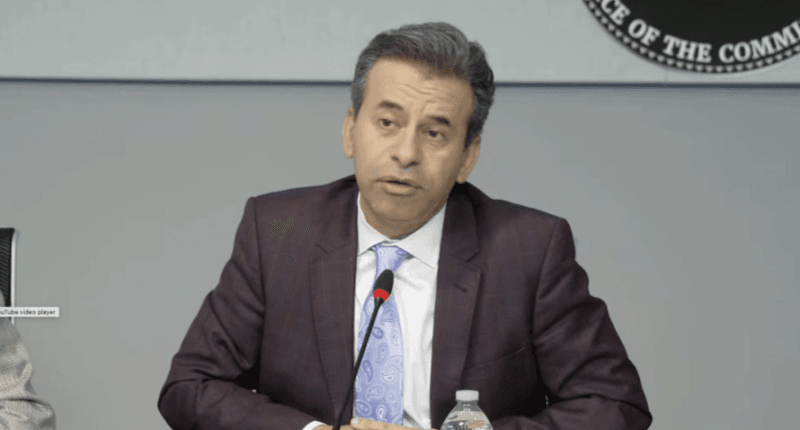Are We Over-Medicalising Menopause?

On July 15, the FDA convened a two-hour expert panel to review its longstanding guidance on hormone replacement therapy (HRT) for menopause.
At first glance, it appeared to be a genuine opportunity to revisit the legacy of the landmark Women’s Health Initiative (WHI), engage with clinical experts, and improve public messaging around hormone treatment.
But beneath the surface, the event raised uncomfortable questions. There was no dissent. The risks of HRT were downplayed, and women were left with the impression that they were jeopardising their health by not taking it.
What unfolded was a lineup of pro-HRT advocates, many with industry ties, in what often felt more like a public relations campaign than a balanced scientific discussion.
Selling the Benefits
FDA Commissioner Dr Marty Makary opened the session with several bold claims.
Hormone therapy, he asserted, could reduce cognitive decline by up to 64%, cut bone fractures by 50%, and lower the risk of heart disease—the leading cause of death in women—by 25%.
“Better than a statin,” he said.

Makary went further, claiming there was no other medication in the history of modern medicine that could improve women’s health on a population level more than HRT “if started within 10 years of the onset of menopause.”
He lamented that too many women remained unaware of newer data reanalysing the WHI and suggested that outdated fears had left them suffering in silence.
“We’ve failed them,” he said.
From the outset, Makary set the tone. The WHI had, in his view, cast a dark shadow, discouraging doctors from prescribing HRT and leaving women confused or untreated.
Speaker after speaker echoed this sentiment. The WHI was described as a catastrophic misstep that had misled millions—“the day the music died,” as one expert put it.
Panelists portrayed the study as a rupture in women’s health education. They argued the WHI had studied the “wrong women”—too old, too far past menopause, unrepresentative of those typically seeking relief—and used the “wrong type of oestrogen.”
Its findings, they said, were overstated, misleading, and plain wrong.
The result?
Millions of women flushing their HRT down the toilet.
Some panellists made extraordinary claims. One doctor said a patient on testosterone therapy had experienced improved mathematical abilities, and described another who was able to recall a foreign language learned in childhood.
Oestrogen was described in near-miraculous terms—preserving bone density, boosting cognition, enhancing mood and sexual function, staving off ageing, and protecting the heart.
Declining levels of oestrogen were framed as a medical emergency. One that, if left untreated, would rob women of vitality, resilience, and longevity.
Several speakers advocated for starting HRT “at least 10 years” before menopause—even in women without hot flushes, mood changes, or sleep disturbances.
What Was Missing?
Absent from this enthusiasm was meaningful engagement with the potential harms. The WHI, published in 2002, remains one of the most rigorous, publicly funded randomised trials ever conducted on hormone therapy.
Involving more than 160,000 postmenopausal women, it was funded by the National Institutes of Health to examine whether hormone therapy could prevent chronic disease.
At the time, it linked oestrogen-progestin therapy to increased risks of breast cancer, stroke, and cardiovascular events.
These findings weren’t outliers.
The Heart and Estrogen/Progestin Replacement Study (HERS), published several years earlier, also found that hormone therapy failed to reduce cardiovascular events—and increased the risk in the first year of use.
Then came the UK’s Million Women Study—a prospective cohort involving more than a million participants—which found that combined oestrogen-progestin therapy significantly increased the risk of breast cancer.
Despite their size and scientific weight, these studies were scarcely mentioned. Instead, panellists leaned on industry-sponsored studies that cast hormone therapy in a more favourable light.
Conflicts of Interest and Lack of Balance
Many of the panellists had ties to pharmaceutical companies that manufacture hormone products.
Some declared these conflicts. Others said they had “no disclosures” despite having authored books promoting hormone therapy, spoken at pharma events, or built entire careers advocating oestrogen use.
This doesn’t invalidate their expertise. But it demands scrutiny—particularly when no dissenting voices were invited. At times, the event resembled an echo chamber.
Risks such as breast cancer, stroke, and blood clots were minimised or dismissed. Meanwhile, the central message was hammered home: menopause is a condition of “oestrogen deficiency,” and HRT is the only answer.
Selling Menopause As a ‘Disease’
An unsettling aspect of the roundtable was its repeated framing of menopause as a pathological condition—a deficiency state requiring pharmaceutical correction.
Without oestrogen, women were told, they were vulnerable to everything from dementia and osteoporosis to heart attacks, sexual dysfunction, and premature death.
This idea—that women are broken and in need of fixing—is not new. It’s long been a central theme of pharmaceutical marketing.
And it sits at the heart of how menopause has been over-medicalised: recast as a clinical problem in need of lifelong pharmaceutical correction.
To be clear, the symptoms of menopause are real.
I watched my own mother struggle with hot flushes and sleepless nights. For many women, these symptoms can be debilitating. But not all women suffer. Some breeze through menopause. Others choose to embrace it as a natural life transition.
And that choice is valid. The panel made it sound like rejecting HRT was irresponsible—when for many women, a natural path through menopause is the right one.
As psychologist and sexologist Dr Leonore Tiefer has warned, “disease mongering” (the pharmaceutical rebranding of normal life transitions as treatable disorders) can turn informed decisions into sources of guilt and make natural choices feel like failure.
Notably, two systematic reviews—one published in JAMA Internal Medicine, the other in Menopause—showed that while some women may report feeling better, those subjective improvements aren’t consistently reflected in objective health measures.
Nor does HRT reliably improve memory, cognition, general health, or sexual satisfaction in asymptomatic women. The gap between personal experience and measurable benefit deserves far more attention than it received.
The Danger of One-Size-Fits-All
Menopause should not be medicalised by default.
At times, it felt like the panel was suggesting that hormone therapy should be a routine, even lifelong, treatment for most women—not only for symptom relief, but for disease prevention.
Yes, the alternatives offered to women are often far from ideal. Many are placed on antidepressants—which carry their own risks.
But long-term hormone therapy may also cause harm—particularly at high doses.
Few doctors discuss the risk of tachyphylaxis, where the body becomes less responsive to oestrogen over time. In some clinics, this leads to escalating doses that may cause harm.
In the UK, clinics are being investigated for prescribing hormone therapies above licensed levels. One prominent example is Dr. Louise Newson, the public face of Britain’s so-called “menopause revolution.”
A recent BBC Panorama investigation reported that 13 women experienced complications, including endometrial thickening—a known precursor to cancer.
Finding the Nuance
Despite the panel’s one-sided tone, a few valid concerns did emerge—particularly around the black box warning applied to vaginal oestrogen.
Makary acknowledged that this warning—on oestrogen creams used for localised symptoms like vaginal dryness—may be outdated.
These products don’t raise systemic hormone levels and carry minimal risk, yet they still bear the same dire cautions as systemic therapies.
Several clinicians called for the label to be revised, which could offer a safer option for women, including those with a history of breast cancer.
There was also recognition that not all hormone therapies are equal. Formulation, dose, delivery method, and timing all matter. But even these nuances were largely overshadowed by the broader push to rehabilitate HRT’s image.
Regulatory Blurring
Following the panel, Makary appeared on The Megyn Kelly Show, doubling down on his pro-HRT stance and urging wider uptake.
He framed the issue as one of systemic neglect, blaming a “male-dominated medical establishment” for failing to take menopause seriously.

But for a regulator to publicly promote a product his agency oversees clearly crosses a line.
The FDA has been explicit: “We’re not your doctor.”
Its role is to regulate—not endorse—medical products, and officials are expected to avoid statements that could be seen as promotional.
The Verdict?
The FDA has said this roundtable was only the beginning of a broader review process.
If restoring public trust is the goal, the next steps must include a more honest, diverse, and evidence-based conversation—one that doesn’t simply cheerlead for hormone therapy.
For some women, HRT can be transformative. For others, it is unnecessary—or even harmful. What women need is clear, independent guidance—not a sales pitch.
Menopause is a natural life stage.
While relief matters deeply for those who need it, we should be wary of the growing trend to over-medicalise women’s health—turning a normal biological transition into a lifelong pharmaceutical dependency.
We should be able to say that—without being accused of dismissing women’s needs or denying them care. They deserve the full picture, without the PR spin.
Republished from the author’s Substack
-

Maryanne Demasi, 2023 Brownstone Fellow, is an investigative medical reporter with a PhD in rheumatology, who writes for online media and top tiered medical journals. For over a decade, she produced TV documentaries for the Australian Broadcasting Corporation (ABC) and has worked as a speechwriter and political advisor for the South Australian Science Minister.
















